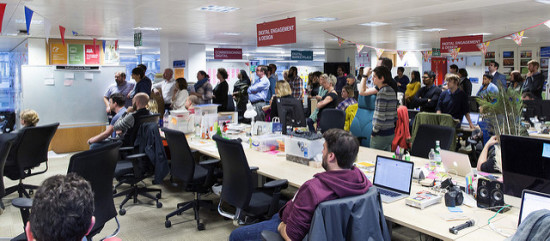Open Source & the Changing of the Guard
16 May 2016Back when I first discovered open source software, at the dawn of my computing and consulting career, I was pretty sure it was some kind of rainbow magic, better than sliced bread. Once other folks found this stuff, it was going to catch on like wildfire, and why not?
- It was way more flexible to build systems with than proprietary black boxes.
- The community around it was helpful and knowledgable, further speeding development.
- The price of deployment was (obviously) unbeatable, and just as importantly, the lack of legal restrictions neatly avoided convoluted “licensing oriented architectures”.
That was over 15 years ago, so clearly I was really, really wrong, at least from the point of view of governments and large corporate enterprises (in the start-up space, the revolution happened over 10 years ago, and nobody is looking back). Over time, I began to reformulate my thesis:

- Open source is a toolkit best appreciated by tool users, and,
- Managers have generally moved beyond direct tool using and use proxy data for decision making, but
- Today’s young staffer is tomorrow’s manager, so,
- Eventually the sands of time will deliver an open source literate population of managers into decision making authority.
This morning, I saw this tweet, which is fun:
Told my boss when he retires I'm moving Dept to FOSS. Have greenlight to start now. @foss4gna @geomenke
— Paul Crickard (@pcrickard) May 14, 2016
That’s one good data point, hooray!
But in all honesty, I don’t feel like there is necessarily an open source wave cresting, certainly not in the big organization I’m nearest to, the BC government.
- Yes, there are some young (and not so young) advocates, who have increased their decision making power over time. But, there is a larger population of similarly aged folks who, from an innovation and risk-taking point of view, might as well be from the last generation. Their ascendance will assure continuity: the only change will be from expensive proprietary on-site software to expensive proprietary SaaS solutions.
- Yes, the overall IT environment is more accepting of open source in general (there is even Linux being run in government!! ooo!). But, in general there is a mismatch in sales fire power between solutions that have high-priced outside sales people promoting them and those that have to be dragged in by staff. Managers (even young ones) have moved beyond direct tool use, and are sitting ducks for a good sales presentation.
So it still falls to in-house innovation centers like GDS or the US Digital Service to try to demonstrate, mandate, and teach a new way of doing things to the old guard of IT.

It’s not clear they are succeeding, even on their own terms. More on that another day.
Do you have links to interesting experiments in doing enterprise IT in a new way? Drop them in the comments, I think it’s time to revisit government enterprise IT and what kind of program can chip away at the culture that has accreted over the last generation.
There’s some interesting experiments out there, let’s hear about them.



